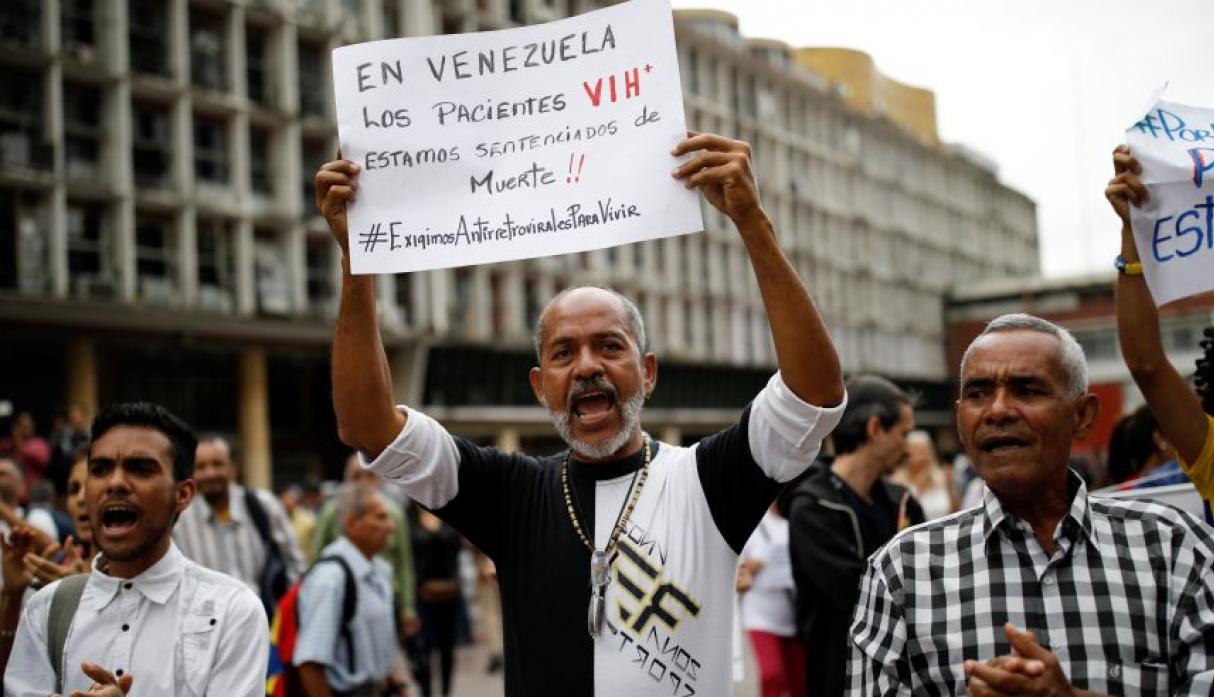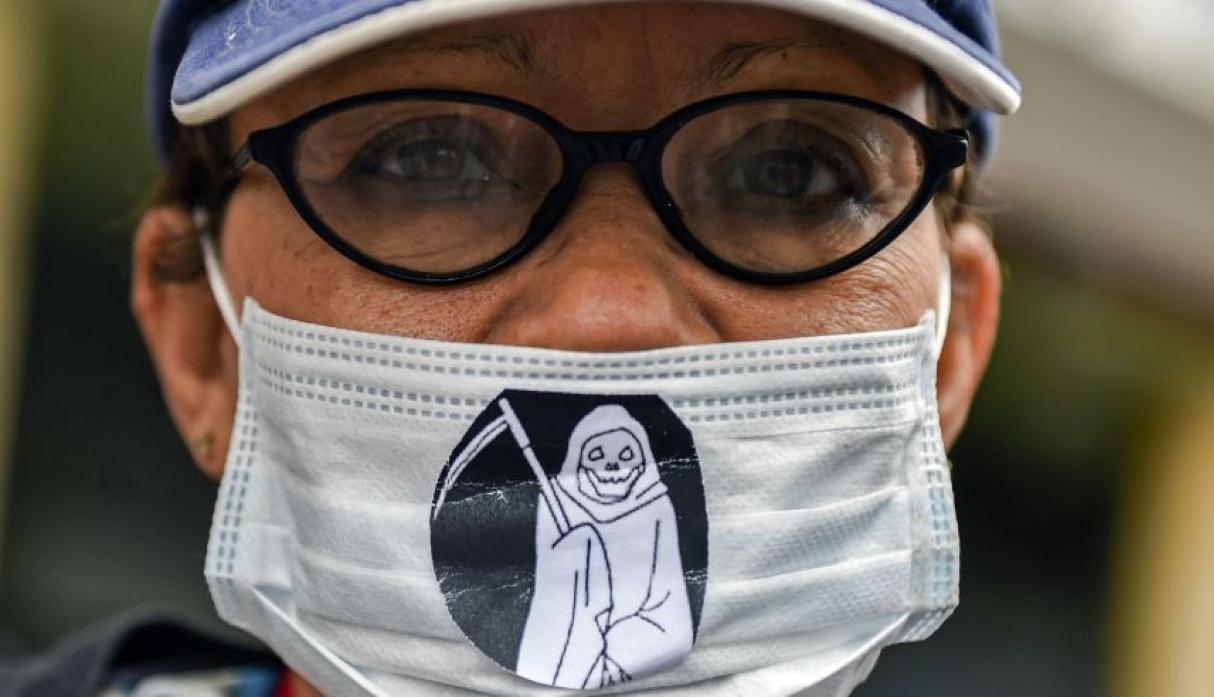Venezuela Falls Under the Triple Attack of HIV, Tuberculosis and Malaria
Seventy three deaths by measles only. Zero improvements for the patients of the more grave diseases. The update of the “Triple Treat” 2017 Bulletin by ICASO and ACCSI is another sign that Venezuela is a menace for the region.


Photo: El Comercio retrieved
In 2017, the Canadian-based International Council of AIDS Service Organizations (ICASO) and Venezuelan NGO Acción Ciudadana Contra el SIDA (ACCSI) released the first “Triple Threat” Bulletin, an X-ray on Venezuela’s health crisis, specifically on tuberculosis (TBC), malaria and HIV. Back then, the findings were grim. You’d expect after a year, someone, and by “someone” I mean chavismo (who—as actioning government for the past two decades—is the sole responsible for the crisis) would have taken action to stop people from dying of preventable, treatable causes.
This month’s update on the bulletin shows little has changed for the HIV, tuberculosis and malaria patients—actually, the term “triple threat” has now fallen a bit short. “A little over a year later, the situation is a lot more serious than we originally foresaw. Every health, poverty, nutrition, economic growth and social development index in Venezuela has loudly worsened, while the Venezuelan government keeps on denying not only the existence of the humanitarian crisis affecting the country but even worse, the entrance of humanitarian aid.”
The bulletin shows figures of HIV, TBC and malaria but also assesses data on other dangerous infectious diseases that made a comeback due to poor public health policies in the country. Measles is now a big concern, with 5,525 confirmed cases in 2018, resulting in 73 deaths.
 The bulletin shows figures of HIV, TBC and malaria but also assesses data on other dangerous infectious diseases that made a comeback due to poor public health policies in the country. Photo: El Comercio retrieved.
The bulletin shows figures of HIV, TBC and malaria but also assesses data on other dangerous infectious diseases that made a comeback due to poor public health policies in the country. Photo: El Comercio retrieved.
Venezuela’s situation is so serious, it could destabilize the region. “All these people are now helpless in front of an indolent government apparatus, and an International Community that reacted only after the lines of people coming from Venezuela began overflowing the borders seeking for medical attention and food (…) Deficiencies in the health system and their impact on the wellbeing of the Venezuelan population and neighbor countries like Colombia and Brazil continued deepening.”
Living conditions worsened, the crisis deepens
2018 was an awful year for Venezuelans. Health and nutrition indexes reached an all-time low, with the regime failing to respond to its duty of warranting human rights and living conditions for its population, and the government’s using food and medicine as tools for social control.
Venezuela has 2016’s worst performance on malaria, and in 2017 the World Health Organization (WHO) reported an estimated 519,109 cases and 456 deaths. Venezuela alone was responsible for 53% of cases and 80% of deaths by malaria in all of the American continent. There was simply no response to stop the spread of the once eradicated disease, as a result: a staggering 700,000 new cases were reported for 2018.
In 2018, about 58,000 people living with HIV were not receiving antiretrovirals (ARV). These drugs are fundamental to stop virus replication and therefore preventing HIV from deteriorating the immune system.
Tuberculosis spread is also on the rise, with an approximate 10,185 cases reported at the end of 2017 (41% rise since 2014.) There’s a troubling shortage of reagents and methods for diagnosis of the disease that affects especially vulnerable people living in prison and indigenous populations.
It’s safe to say the regime has done a great job at helping the spread of perfectly preventable diseases. But Maduro’s subjects won’t stop at the sight of epidemiological mayhem, they’ll also make sure to hinder and criminalize NGOs efforts to treat unassisted patients.
The International Response
The NGO’s and civil society’s response against the government’s inaction has never been more important. Using innovative resources like crowdfunding, these organizations have tried to aid suffering citizens, and it was because of their tireless work of spreading the truth that, in 2018, the Pan American Health Organization (PAHO) published a technical report portraying the critical situation of the Venezuelan healthcare system. Even though epidemiological data published in their report wasn’t the most recent, it was nothing short of alarming.
The ICASO 2017 Bulletin explained why Venezuela didn’t meet the criteria to receive aid from The Global Fund (the international war chest to fight malaria, tuberculosis and HIV.) Thanks to NGOs pressure, the fund revisited their criteria, making it possible for Venezuela to qualify.
 The NGO’s and civil society’s response against the government’s inaction has never been more important. Photo: El Comercio retrieved.
The NGO’s and civil society’s response against the government’s inaction has never been more important. Photo: El Comercio retrieved.
PAHO, alongside the United Nations AIDS programme (UNAIDS), also created “the masterplan for strengthening the HIV, tuberculosis and malaria response in the Bolivarian Republic of Venezuela from a public health perspective.” The plan establishes prioritized resource spending of $122 million over a three year period for HIV, malaria and TBC programs, of which more than half will go towards the purchase of ARV drugs.
ARVs are a priority, and last September, the global fund approved $5 million for them, with the first ones arriving in Venezuela in early 2019. There have been a number of delays in the chain of distribution for the drugs, however, as the government has decided to hoard the much-needed medicine.
The Red Venezolana de Gente Positiva (RVG+) began monitoring this arrival, and observed numerous irregular practices in the storage of previously donated drugs through 2018, realizing the drugs were never handed to HIV programs but remained hidden in the government’s warehouses. The report doesn’t say why.
The United Nations have also approved a $9,2 million fund for Venezuela’s humanitarian crisis and, last October, UNICEF subscribed a deal with the regime, investing $32 million on prevention programs for children and pregnant populations.
ICASO reports that, by the closing time of the bulletin, there was no evidence of UNICEF’s aid being delivered to the population.
ICASO’s recommendations
Venezuela’s complex humanitarian crisis requires an immediate, realistic and concrete response. Delays in decision making translates into more deaths and that’s what makes the execution of HIV, TBC and malaria prevention programs an urgent matter.
What can definitely be extracted from the bulletin is the regime’s direct responsibility in the deaths of thousands of Venezuelans. Organizations like ICASO, RGV+ and many other NGOs have warned the international community about the upcoming disaster for years, but the government’s denial made it extremely difficult for the world to get a proper idea of the tragedy Venezuelans were living, and still are.
While organizations like PAHO and the Global Fund are now aware, they are sure taking their time, and the triple threat won’t wait.
Caracas Chronicles is 100% reader-supported.
We’ve been able to hang on for 22 years in one of the craziest media landscapes in the world. We’ve seen different media outlets in Venezuela (and abroad) closing shop, something we’re looking to avoid at all costs. Your collaboration goes a long way in helping us weather the storm.
Donate




